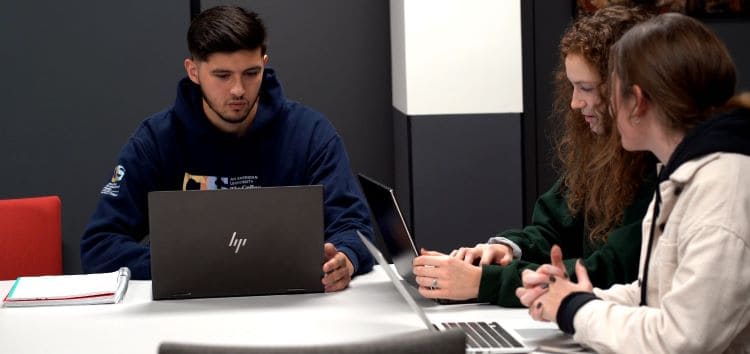The happenings we have experienced over the last few years have inevitably pushed us towards screens. Video calls, virtual conferences and online classes have gone from being an option to gaining ground and becoming part of our daily lives.
At this point of the film, no one can deny that the pandemic has meant a change of habits worldwide so, in this context and looking at things with perspective, we would like to invite you to reflect with us on the convenience of online classes vs. in person classes in university degrees.
Will you join us?
Online vs in person classes pros and cons
Let’s start by evaluating the pros and cons of online vs in person classes.
Pros of online classes
- They adapt to the learning pace and schedule of each student.
This advantage is especially appreciated by adult students who combine online classes with their family or work obligations and cannot follow the normal rhythm of classes.
- They eliminate physical and distance limitations.
Online training is not only a great option for people who have mobility issues, but also for those who do not want to leave home to study their desired degree.
- They are often more affordable than in-person classes.
One of the main differences between online vs. in-person classes is that online classes do not require any physical space, so therefore, there is no capacity limitation and, as a consequence, the price of the training is usually more affordable.
Cons of online classes
- Increases the risk of frustration and dropout by students due to the feeling of loneliness they may experience when studying at distance.
- Online classes usually offer a passive learning model, so student involvement is lower than in face-to-face classes.
- Another disadvantage of online vs. in-person classes is that there are some subjects that are difficult to transfer to the online world due to the equipment and instruments they require, such as chemistry or nursing.

Pros of in person classes
- One of the great advantages of in person vs. online classes is the possibility of involving students during explanations, of opening debates and, in summary, of carrying out dynamics to encourage student participation.
- By carrying out a more active education model, the attention and commitment that is achieved through in person classes is much higher than in the online modality.
- Another of the differential points of online vs. in person classes is that physical universities offer the possibility of creating new friendships and improving your social and communication skills.
Cons of in person classes
- The main disadvantage of in person classes vs. online courses is that there are many students who may not be able to find a university that teaches the specialty you are interested in near their home.
- Consequently, attending classes in person requires a time investment in travel that is not necessary for online classes.
- These circumstances make attending classes in person more expensive than online classes.
Which one is better: Online vs in person classes
After reviewing the advantages and disadvantages of online vs in person classes, we are clear.
We understand that online classes can be useful in some cases, but when the goal is to lay a solid foundation for the future of our students, quality is what comes first.
That is why at CIS University we are committed to in-person classes and everything that comes with face-to-face education. And that is why we have created a department to support our students in their learning process at all levels.
Because at CIS University we believe in a global education and we want our young people, not only to learn the course syllabus, but also to learn how to relate to others and begin to create their own network of contacts with people of any nationality, develop their emotional and communicative skills, learn to work in a team and train their empathy by living with realities different from their own.
Do you think the same way we do about online vs. in person classes?
If so, we invite you to visit our website, where you will find more information about our philosophy and educational proposal.

